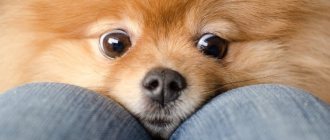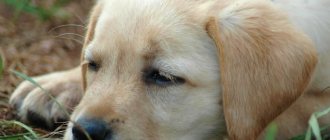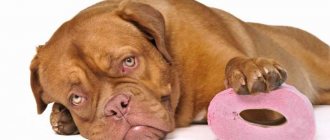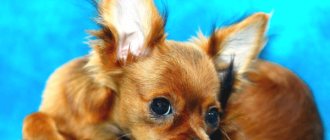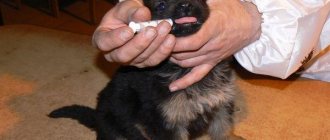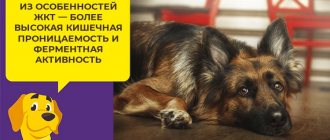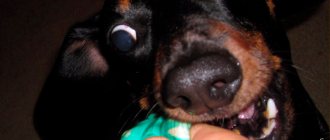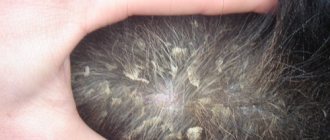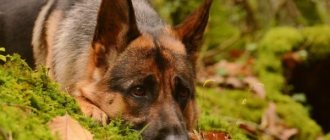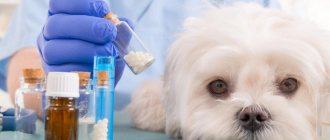Loose stools in large breed dogs: shepherds, labradors, huskies, sharpeis
Problems with the animal’s digestion create inconvenience for both the pet and its owner. The first questions that concern a person when a dog’s health deteriorates are what is the cause of the disease, how serious it is, and where to go for help. Finding loose stool in a dog is unpleasant and almost always unexpected, especially if it occurs in an animal of a decorative breed. Moreover, the effect of diarrhea on the animal’s body is the same, regardless of the breed and size of the dog.
To help your pet, it is necessary, first of all, to determine the reason why diarrhea began. To do this, you should visit a veterinarian who will give you qualified advice, depending on the individual characteristics of your pet and its condition. Prescriptions can be different - from diet and diet correction to serious drug treatment.
Causes of diarrhea
What should you do if your puppy has diarrhea, vomiting or other alarming symptoms, but there is no opportunity to visit a veterinarian? The situation is complicated, but you have no choice but to try to determine the reasons yourself.
Important! Loperamide is considered an effective remedy to stop diarrhea in animals, but its use without an accurate diagnosis, prescription and supervision of a doctor is strictly prohibited!
Power change
A common cause of diarrhea in puppies, which is not serious, is a sudden change in diet. Of course, the puppy needs to be transferred to a new diet gradually, but if he managed to eat something forbidden and, as a result, diarrhea began, no special measures need to be taken. Place your pet on a fasting diet for 10–12 hours. To prevent dehydration, the puppy can be given Ringer's solution, or Smecta or Enterosgel to reduce irritation of the intestinal walls.
Why do large dogs develop diarrhea and severe diarrhea?
The most common source of diarrhea and vomiting is poor diet. In particular, when changing one food for another, switching to homemade food, or as a result of eating stale treats. Diarrhea is also caused by components of food to which the animal is allergic, or by unintentionally swallowing inedible objects (pebbles, caps, small children's toys). Viral diseases that affect dogs, such as distemper or hepatitis, or fungal diseases, such as histoplasmosis, can provoke the appearance of loose stools.
In puppies, diarrhea often begins due to parasitic infections affecting the digestive system. The risk zone includes, first of all, unvaccinated puppies, old individuals and representatives of decorative breeds. In addition to those mentioned above, the occurrence of vomiting and diarrhea in a dog is influenced by factors: infection with worms and other parasites; use of a low-quality drug for vaccination; food, toxic and chemical poisoning, irritating the mucous membranes of the stomach and intestines; mechanical damage to the intestinal walls; various diseases and cancers of the digestive system; lack of vitamins and dysbacteriosis; bacterial infections as a result of drinking or eating from puddles, from the floor, etc.
You can find out the preliminary reason for the appearance of loose stools in your four-legged friend by the color of his stool: yellow color, especially with blood or mucous inclusions, indicates parvovirus enteritis, black indicates the presence of intestinal bleeding, white is the most likely sign of the development of liver disease, green is one of the frequent manifestations of canine distemper. Changes in the color of loose stool in dogs, and especially in puppies, are a good reason to seek help from a veterinarian. It is also important to notice blood impurities in the animal’s feces in time, since, along with other diseases, they signal rabies, which occurs in an atypical form.
Bloody diarrhea with simultaneous vomiting can be caused by chemical poisoning, side effects of certain medications, or injuries to internal organs. The safest case for a dog’s health if blood gets into the feces is the presence of microtraumas of the anus. The appearance of mucus in the feces of a pet is evidence of abnormalities in the gastrointestinal tract. Diarrhea can cause putrefaction, which begins as a result of foreign objects entering the intestines.
Mucus in liquid stool is a common symptom of infection or inflammation in the animal's intestines. To provide your dog with first aid in a timely manner, you must always pay attention to changes in its well-being, behavior, as well as the nature, consistency and color of stool, and know how to act in the presence of certain symptoms. Diarrhea that continues in a puppy or adult dog for a long time can lead to other uncomfortable symptoms: nausea and vomiting, cough, weakness, drowsiness, fever. Diarrhea along with vomiting occurs with poisoning or various infections. Nausea followed by vomiting occurs in many diseases, so focusing on them alone is not enough to make a diagnosis.
More rare cases of periodic vomiting in a dog without diarrhea, which is a physiological feature of man’s four-legged friends, which they inherited from previous generations.
Why does diarrhea occur?
Adult, mature individuals of this breed easily digest hard bones and dry food and are not picky in their diet. At the same time, puppies require care and a properly developed diet. Diarrhea in a German Shepherd puppy can be caused by spoiled food, overeating, as well as a sudden transition from dry food to natural food. When giving your pet a new “dish”, you need to carefully monitor his reaction. There is a high probability that diarrhea in a shepherd dog is a consequence of personal intolerance to the components of natural food or feed. Therefore, each new product must be introduced separately, no more than one every 24 hours.
Diarrhea in a German Shepherd can be stressful. Representatives of this breed are considered the most intelligent animals among their own kind. They adapt well to a new environment, but this takes time. Finding itself in an unfamiliar environment, a small dog becomes frightened, and its body reacts to fear with diarrhea.
Loose stools in a German Shepherd puppy can be caused by infectious diseases. Infection occurs when an animal comes into contact with a pathogen carrier, through the consumption of low-quality products and in the absence of necessary hygiene. There are often cases where diarrhea in a German Shepherd puppy was caused by poisoning. Toxic substances ingested with food begin to ferment in the intestines and cause typical symptoms. You can recognize poisoning by the following signs:
- vomit;
- temperature increase;
- apathy;
- refusal of food;
- drowsiness.
If you suspect that poisoning caused your German Shepherd's diarrhea, you should consult a doctor as soon as possible. Poisoning is often accompanied by intoxication and dehydration, which can lead to the death of the animal.
Forms of diarrhea in dogs, what types of diarrhea can a shepherd have
The course of diarrhea is conventionally divided into acute and chronic forms. In the acute form, loose stools do not stop for several weeks. If it is not accompanied by other painful symptoms, then the source of the animal’s illness should be sought in the quality of food and food products that have entered the pet’s food. In this case, treatment can be carried out independently. If treatment measures do not bring a positive result within 24 hours, you should seek help from a veterinarian. This is especially true for situations where stool disturbances are observed in unvaccinated puppies, since it may indicate the development of infectious and viral diseases that are life-threatening to the animal.
Chronic diarrhea occurs due to many reasons. The easiest of them is overeating. Often this situation arises when owners or guests show love for the puppy by treating them with treats that are not always beneficial for the growing body. In many cases, chronic diarrhea is caused by malabsorption - a digestive disorder in which food is not completely digested and absorbed, which causes a deterioration in intestinal secretion and disruption of processes dependent on it.
Chronic diarrhea often occurs as a residual effect of long-term diseases, including gastritis, enteritis, pancreatitis, hepatitis, and others, including impaired metabolism. Chronic diarrhea is characterized by stages of exacerbation and remission, affecting the functioning of the gastrointestinal tract and endocrine system. Considering the above, in order to select and apply the correct and effective treatment for stool disorder in a dog, you should seek the help of a specialist.
Symptoms of diarrhea in dogs
All symptoms of diarrhea in a dog directly depend on the severity of the disease. Canine diarrhea is usually accompanied by the following symptoms:
- feces become much softer than usual;
- strong smell of stool, as well as bloody spots;
- Various shades of feces: they can be green, yellow, brown or black;
- during bowel movements the animal begins to whine or moan painfully;
- the pet begins to defecate frequently, possibly with a small amount of feces;
- slime;
- the dog’s behavior directly: it is constantly worried about something or simply exhibits extremely sluggish vital activity;
- constant vomiting;
- increased body temperature of the animal;
- gurgling in the stomach.
All of the above symptoms are, one way or another, associated with diarrhea in a dog. If you witness at least one of them, or, even worse, several at once, you should immediately contact your veterinarian.
A dog has diarrhea with blood: what to do?
If there is blood in your pet's stool with diarrhea, the problem is likely caused by an unusual food poisoning. In most cases, this is accompanied by some kind of serious illness.
There are several most popular diseases that are accompanied by this problem:
- Serious poisoning. Since any pet spends a large amount of time outside, it constantly picks up and eats all sorts of objects from the ground, as well as low-quality food. As a result, serious irritation occurs on the intestinal walls and bloody diarrhea occurs.
- Parvovirus enteritis. This, unfortunately, is a very serious animal disease that often leads to death. Enteritis mainly appears in puppies under one year of age, and if timely medical assistance is not provided, the puppy will die.
- Traumatic enterocolitis. This disease means that the dog’s diarrhea was caused by the appearance of a foreign body in the animal’s digestive system, which injured the walls of the intestines or stomach.
- A side effect of any medication taken by an animal.
Acute form of diarrhea
If we look at veterinary statistics, we can conclude that most often dogs suffer from an acute form of diarrhea. In this case, the disease appears suddenly and, fortunately, does not last so long.
As a rule, acute diarrhea in dogs lasts a maximum of 2-3 weeks, however, this disease is one of the most serious, and therefore requires immediate treatment.
Chronic form of diarrhea
This form of diarrhea is characterized by a long duration, namely more than a month. Feces contain large amounts of blood as well as mucus.
In this case, the main and often the only cause of the disease is the consumption of poor quality food. In the rarest cases, the chronic form is caused by infectious or parasitic diseases.
Unfortunately, with chronic diarrhea, the dog suffers the most: during the presence of the disease, the pet loses a large amount of weight, loses appetite, the quality of its coat deteriorates, and the joy of life disappears.
What can you feed your dog during diarrhea (diarrhea) and after it ends?
If a pet develops diarrhea, owners should take immediate steps to treat it. The clearest and most correct answer regarding the animal’s nutrition during the period of illness can be obtained only after a diagnosis has been made. However, there are universal rules that can be applied in any situation with diarrhea, provided there are no accompanying aggravating symptoms: vomiting, weakness and fever. During the first 24 hours, the dog should not be given any food. Since diarrhea is dangerous for any mammal due to rapid dehydration, your pet should be given lukewarm, clean water. You can also use infusions of blueberries, St. John's wort, sage and St. John's wort, or brew a weak tea.
To maintain the water-salt balance and prevent intoxication, it is allowed to use rehydration drugs and adsorbents, which are injected into the animal’s mouth using a syringe with the needle removed. Over the next few days, it is recommended to feed the dog with easily digestible food. Acceptable foods include low-fat boiled chicken or beef, low-fat cottage cheese, steamed rice, and dietary broths. To reduce the effect of toxins on the victim’s body, an animal (both an adult dog and a puppy) can be given activated charcoal at the rate of 1 tablet per 10 kilograms of weight.
When the uncomfortable symptoms completely cease to appear, you can gradually return the pet to its usual diet. To normalize intestinal functions and prevent dysbiosis, bifidobacteria are included in the dog’s menu for the next few weeks after illness. For preventive purposes, it is recommended to avoid feeding pets with food from the owners’ table.
Treatment of loose stools in dogs using medication
Clinical treatment of four-legged pets is carried out on an individual basis. Lactobacillin helps normalize the state of microflora. Treatment of chronic diarrhea is prescribed depending on the etiology of the disease. In case of blockage of the biliary tract, agents are used that stimulate the excretion of bile (Ursofalk, Allochol, etc.). Therapy of pancreatic insufficiency is carried out with the help of Mezim, Festal, Creon, Pancreatin and their analogues.
To keep your dog healthy and able to quickly get help if necessary, it is important to visit one veterinarian who will be familiar with your pet's characteristics and medical history.
German Shepherd – causes of diarrhea, treatment and prevention
The best qualities of this breed are manifested in well-groomed dogs with good health, the maintenance of which consists of attention and painstaking work on the part of the owner. To ensure optimal physical condition of a German Shepherd, a balanced diet with a predominance of protein foods is necessary. The daily menu should include boiled eggs, dairy products, fish, cereals, boiled vegetables, with the exception of potatoes, which are poorly digested by dogs and have almost no benefit. If natural feeding is used, vitamins should be added to the food.
Giving your pet pasta and flour products is not recommended, as they impair its performance and can cause obesity. The list of undesirable foods also includes sausages, beans, smoked and pickled foods. It is necessary to calculate the portion of food for one meal for an adult dog, taking into account the weight of the animal and the nutritional value of the food. To ensure that the puppy's skeleton is formed correctly, when feeding small German Shepherds, you should use a special stand that allows you to adjust the height of the bowl. The optimal height is at chest level.
This breed is characterized by hereditary visual impairments and diseases of the musculoskeletal system. The best place to keep a German Shepherd, as well as representatives of other large breeds, is a covered outdoor enclosure. For such a dog to live comfortably in a city apartment, it is necessary to designate the object that it needs to protect and give it the opportunity to feel its importance.
Answer
A nutritious and healthy diet for your German Shepherd is the basis for health and excellent physical fitness. The German Shepherd is a predator. The digestive system of an animal is different from that of a human. The differences are expressed in features:
- It doesn't matter at all what the food looks like or what it tastes like. The most important thing is the smell.
- The dog swallows food in pieces and rarely chews it, so food enters the stomach unprocessed. The shepherd's stomach, which is small in volume, has high acidity and the activity of digestive enzymes - food is processed extremely quickly.
- The short small intestine has increased absorption capacity and is not adapted to digest large volumes of plant foods.
- Proteins are best absorbed, fats come second, and carbohydrates come third. The dog’s body lacks enzymes that break down starch and other selected carbohydrates, the contents of plant cells of which are not digestible.
When fed properly, your dog's stool is virtually dehydrated and helps cleanse the anal glands located along the walls of the rectum.
If digestion is impaired, the feces become soft, the secretion of the anal glands stagnates, which leads to inflammation.
Labradorite - diarrhea treatment and prevention
Caring for a Labrador is similar to caring for other large dogs. At the same time, this breed has a number of distinctive features. First of all, these are regular hygiene procedures that drooping ears need. Labradors also have a dense and almost waterproof undercoat. The dog's coat is highly self-cleaning, so it does not require frequent washing. You can comb it several times a week.
The Labrador Retriever quickly gains excess weight as a result of indiscriminate eating and eating prohibited foods. Therefore, an important task for the owners of such a dog is to follow the rules of nutrition and a healthy diet for the pet. The emphasis is on meat and vegetables, the volume of cereals should be minimal, and it is better to exclude pasta and flour products from the diet. It is also important to provide the dog with exercise and play in the fresh air that is appropriate for its age and physical condition.
Shar Pei - causes of diarrhea, how to treat, prevention
Representatives of the breed are known as excellent watchdogs, intelligent, freedom-loving and very strong animals with a good appetite. The folded skin and ears of Shar-Peis are their vulnerable spot, so when bathing, the ears should be covered, and the coat should be thoroughly dried after bathing to avoid microbial and skin diseases. Shar Peis are picky eaters and are prone to food allergies. Therefore, it is not recommended to frequently change their food, enriching it with vitamin supplements until the age of one and a half years. Food should be thick and dry, and broths and soups should not be given to dogs of this breed.
Husky, treatment and prevention of diarrhea
The main advantages of Siberian Huskies are their high intelligence and amazing endurance. They are very active and require mandatory walks in the fresh air for at least one hour a day. Huskies are very clean, practically do not shed and have no characteristic odor. The weak point of the breed is eye diseases and atopic dermatitis. Feeding the dog is usually done after a walk. Huskies are not picky about their diet; they eat dry or canned food as well as home-cooked food equally well, but if given a choice, they prefer the latter.
Husky
External wild beauty combined with endurance and intelligence give an almost ideal combination of characteristics of the Siberian Husky breed. Even a puppy requires constant exercise and movement. Although they can live in an apartment, they need the opportunity to run around in nature for at least an hour a day. Huskies are very easy to keep, as they are clean by nature and do not smell, and practically do not shed. Their main diseases include eye diseases (for example, entropion, cataracts, glaucoma, retinal atrophy) and atopic dermatitis. It is ideal to feed your Husky immediately after a walk. The amount of food will depend on both the age of the dog and his living conditions. It is not difficult to choose dry food for this breed; it is important to have a balanced diet, taking into account individual characteristics. The owners also give them canned dog food and natural food (fresh or frozen). These dogs eat homemade meals with pleasure; they treat canned food with a semi-liquid consistency and dry food with more restraint.
